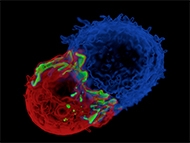Paola Murgas
Assistant Professor
Dr. Paola Murgas Alcaíno studied Biochemistry at the Universidad Austral de Chile. Subsequently, she obtained his Master's Degree in Cell Biology and later her PhD in Cellular and Molecular Biology at the Pontificia Universidad Católica de Chile. She did her post-doctorate at the Fundación Ciencia y Vida and then worked as a researcher at the Faculty of Medicine of the Universidad del Desarrollo. For several years, she has been working as a titular professor ad honorem of the Master in Science, mention Free Radicals in Biomedicine at the Faculty of Medicine in University of Valparaiso. She actively collaborates with the different teaching activities. Currently, Dr. Murgas is part of our institution, working as an assistant professor developing her research on immune system specifically in inflammatory processes, aging and central nervous system. She is also a member of the Flow Cytometry Core, recently formed in our University, which represents a great potential of research, development and innovation of the CIB.
PUBLICATIONS
Murgas P, Bustamante N, Araya N, Cruz-Gómez S, Durán E, Gaete D, Oyarce C, López E, Herrada AA, Ferreira N, Lladser A. 2018. A filamentous bacteriophage targeted to carcinoembryonic antigen induces tumor regression in mouse models of colorectal cancer. Cancer Immunol Immunother. 2018 Feb;67(2):183-193. doi: 10.1007/s00262-017-2076-x. Epub 2017 Oct 12.
Gálvez-Cancino F, Roco J, Rojas-Colonelli N, Flores C, Murgas P, Cruz-Gómez S, Oyarce C, Varas-Godoy M, Sauma D, Lladser A. 2017. A short hairpin RNA-based adjuvant targeting NF-κB repressor IκBα promotes migration of dermal dendritic cells to draining lymph nodes and antitumor CTL responses induced by DNA vaccination. Vaccine. 2017 Jul 24;35(33):4148-4154. doi: 10.1016/j.vaccine.2017.06.041. Epub 2017 Jun 27.
Eugenín, J., A. Vecchiola, P. Murgas, P. Arroyo, F. Cornejo, and R. Von Bernhardi. 2016. Expression Pattern of Scavenger Receptors and Amyloid-β Phagocytosis of Astrocytes and Microglia in Culture are Modified by Acidosis: Implications for Alzheimer’s Disease. J. Alzheimer’s Dis. 53. doi:10.3233/JAD-160083.
Murgas, P., F.A. Cornejo, G. Merino, and R. Von Bernhardi. 2014. SR-A regulates the inflammatory activation of astrocytes. Neurotox. Res. 25. doi:10.1007/s12640-013-9432-1.
Murgas, P., B. Godoy, and R. Von Bernhardi. 2012. Aβ potentiates inflammatory activation of glial cells induced by scavenger receptor ligands and inflammatory mediators in culture. Neurotox. Res. 22. doi:10.1007/s12640-011-9306-3s.
Godoy, B., P. Murgas, J. Tichauer, and R. Von Bernhardi. 2012. Scavenger receptor cla
RESEARCH LINES

1. Immunology
Our research group is interested to know the role of the immune system in inflammatory processes. This idea began when we discovered the presence of a Scavenger receptor in astrocytes, which are fundamental for the activation of these cells and IL-1β secretion. This Scavenger receptor is also essential for phagocytosis of the Aβ peptide by microglia. This work produced several publications related to the participation of the immune system and Alzheimer disease. Also, as a group we want to explore what happens in processes in which pro-inflammatory activity is inhibited, as it is in cancer. In tumor models we found that by interrupting the anti-tumor microenvironment with a pathogen, the tumor are reduced over an 80% in the animals. Now, we are interested in the role of the immune system in inflammatory processes, associated with age and aging and, how this system affects the nervous system and other organs; our idea is to find targets of study to generate knowledge and future strategies that allow us to avoid diseases and improve the quality of life.
PROJECTS
Name: Fondo Interno FDP
Title: Cambios en la vía de señalización cGAS/STING en microglías durante envejecimiento
Sponsor Institution: Universidad Mayor
Responsible Investigator: Paola Murgas
Date of execution: 2019-2019
NETWORK
National
Marilyn Paz and Carlos Jara, Oxidative Stress Laboratory, Center for Biomedical Research, University of Valparaíso, Valparaíso, Chile.
Caroline Weistein, Laboratory of Therapeutic Innovation and Molecular Diagnostics, Faculty of Pharmacy, University of Valparaíso, Valparaíso, Chile.